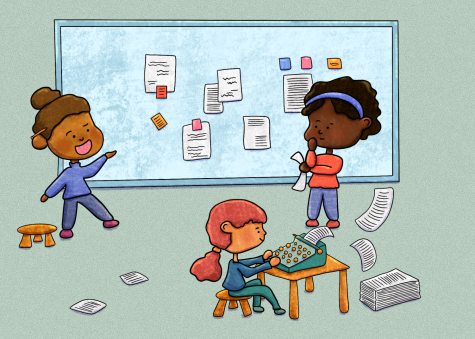An ‘empathetic heartbeat’: Two biographies by Columbia authors showcase the collaborative process in telling others’ life stories
October 18, 2022

There is a pervasive myth about the author alone at a desk with nothing but a computer for company.
According to Brandi Larsen, a 2010 alum with a bachelor’s in fiction, nothing could be further from her experience.
“I think we can get tricked into this idea that publishing is this solitary process,” Larsen said. “But it’s one of the most collaborative art forms.”
Larsen has co-authored — or, as she puts it, “co-parented” — “Uncultured: A Memoir” alongside the book’s subject, Daniella Mestyanek Young. The book was released in September of this year. Among its many accolades, the memoir recounting Mestyanek Young’s childhood in the Children of God cult and her time as a military intelligence officer has been recommended by The New York Times, named a Buzzfeed Best Book of September, excerpted in Rolling Stone and earned a starred review in Publishers Weekly.
“Uncultured” explores the ways in which cults and the military manifest “groupthink.” Psychology Today said groupthink happens when a well-intentioned group of people, fueled by a united agenda, value conformity above critical thought and dismantle individualism in order to crush dissent.
“Every story we told in ‘Uncultured’ tied back to … a group psychology concept that says that humans will do almost anything to fit into groups they are voluntary members of,” Mestyanek Young wrote in an email to the Chronicle.
The book’s exploration of groupthink is particularly relevant in today’s sociopolitical environment, such as the events of Jan. 6, 2021, when a mob of Trump supporters and far-right extremists attacked the Capitol Building in Washington, D.C.
“After the events of January 6, people were asking, ‘How did we get this way?’ It feels like I’m in a cult,” Larsen said.
A memoir like Mestyanek Young’s can confront or offer an explanation for issues beyond an individual experience. Larsen said people turn to memoirs because the story of one person’s life can tell a greater truth about the world.
This thought is echoed by another Columbia writer, Kelley Engelbrecht, a Master of Fine Arts candidate in Columbia’s creative nonfiction writing program. Engelbrecht is currently ghostwriting an as yet untitled biographical novel about German-Yugoslavian World War II refugee Else Moczisko for Moczisko’s daughter, Elizabeth Ritt.
“When you read a story about a woman who made it through a … wartime experience, you can’t help but think about the people who are living through this wartime experience right now,” Engelbrecht said.
Ritt provided Engelbrecht with interviews and source material she gathered from her mother before Moczisko’s death from COVID-19 on Christmas Day in 2020.
Engelbrecht said she can not help but draw parallels between Moczisko’s story and the war in Ukraine.
“Elizabeth and I had a meeting the week that the Ukrainian war started … this is why we tell these stories, right?” Engelbrecht said.
Both Mestyanek Young and Larsen’s “Uncultured: A Memoir” and Engelbrecht and Ritt’s biographical novel are manuscripts written by multiple collaborators. However, the difference between a co-author like Larsen and a ghostwriter like Engelbrecht is unique to the agreements worked out between the collaborators.
As a co-author, Larsen’s name is included beneath Mestyanek Young’s on the title page of “Uncultured.” Co-authors often do not receive an upfront fee but share royalties, according to The Writers For Hire, Inc., a publishing resource and editorial service for authors.
Ghostwriters are typically paid with upfront fees and are not listed anywhere in the published writings. As a ghostwriter, Engelbrecht received an upfront fee. Unlike most other ghostwriters, though, the collaborators agreed that Engelbrecht’s name would appear beneath Ritt’s on both the book’s cover and title page.
“That would be like, by Elizabeth Ritt, as told to Kelly Engelbrecht,” Engelbrecht said.
For Larsen, that partnership extended beyond herself and Mestyanek Young. A third collaborator, author Amy Reed, and their editor Hannah Phillips at St. Martin’s Press, were vital contributors during the writing process.
“I was also very glad to have such an amazing group of women working with me to write this book about group behavior,” Mestyanek Young said. “I would not have wanted to do this project solely from my perspective.”
Engelbrecht stressed the importance of how writing a memoir or biography about one person’s life can capture a universal experience that brings people together.
“I think the reason why you tell these stories,” she said, “is so that we can further develop that empathetic heartbeat.”
For Larsen as well, bringing Mestyanek Young’s story to the masses was important.
“Think about all of the people who are coming together in collaboration to make something bigger than themselves,” Larsen said. “Because at some point, someone will read this. And something will change in them. … Oh, what a gift.”







